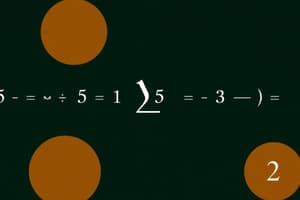Podcast
Questions and Answers
Which mathematician introduced the concept of sets?
Which mathematician introduced the concept of sets?
- Euler
- G. Cantor (correct)
- Pythagoras
- Newton
What is the definition of a set?
What is the definition of a set?
- A collection of elements with no repetition (correct)
- An ordered collection of elements
- A collection of elements with no rules
- An unordered collection of elements with repetition
Which field of study is based on set theory?
Which field of study is based on set theory?
- Biology
- Graph theory (correct)
- Physics
- Chemistry
How can a set be represented in tabular form?
How can a set be represented in tabular form?
Which of the following is an example of a set?
Which of the following is an example of a set?
Flashcards are hidden until you start studying
Study Notes
Set Theory Basics
- The concept of sets was introduced by German mathematician Georg Cantor.
- A set is a collection of unique objects, known as elements or members, that can be anything (numbers, letters, people, etc.).
- Set theory is the foundation of modern mathematics, particularly in the field of Topology.
Representing Sets
- A set can be represented in tabular form using curly braces { }, which contain all the elements of the set, separated by commas.
Examples of Sets
- The set of all even numbers: {2, 4, 6, ...}
- A set of all students in a class: {John, Maria, David, ...}
- Note: A set can be finite (limited number of elements) or infinite (unlimited number of elements).
Studying That Suits You
Use AI to generate personalized quizzes and flashcards to suit your learning preferences.




